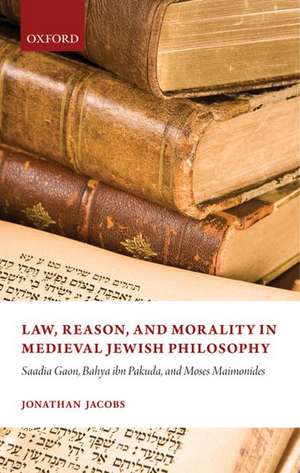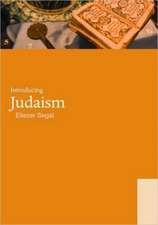Law, Reason, and Morality in Medieval Jewish Philosophy: Saadia Gaon, Bahya ibn Pakuda, and Moses Maimonides
Autor Jonathan Jacobsen Limba Engleză Hardback – 5 aug 2010
Preț: 655.26 lei
Preț vechi: 994.21 lei
-34% Nou
Puncte Express: 983
Preț estimativ în valută:
125.40€ • 130.44$ • 103.52£
125.40€ • 130.44$ • 103.52£
Carte tipărită la comandă
Livrare economică 03-09 aprilie
Preluare comenzi: 021 569.72.76
Specificații
ISBN-13: 9780199542833
ISBN-10: 019954283X
Pagini: 246
Dimensiuni: 148 x 223 x 23 mm
Greutate: 0.43 kg
Editura: OUP OXFORD
Colecția OUP Oxford
Locul publicării:Oxford, United Kingdom
ISBN-10: 019954283X
Pagini: 246
Dimensiuni: 148 x 223 x 23 mm
Greutate: 0.43 kg
Editura: OUP OXFORD
Colecția OUP Oxford
Locul publicării:Oxford, United Kingdom
Recenzii
rich in ideas and arguments. Jacobs has to be congratulated on his excellent style throughout, which succeeds in dealing with a lot of difficult material in a clear, and it has to be said, pretty comprehensive manner... This is a remarkable work and will stimulate a good deal of discussion and debate.
Jacobs has performed an excellent service to scholars of medieval Jewish thought in showing its relevance today, as well as in proposing an authentic way to read the medieval philosophers by trying to avoid the retrospective use of post-Enlightenment categories.
one of the most encompassing, sensitive, and helpful appreciations of Judaism's covenant-based but legalistically-structured relationship with the deity available today. Along the way Jacobs corrects a host of misconceptions.
Ultimately, Jacobs book is a terrific success. An informed and attentive reader cannot help but see parallels between the medieval ideas discussed and key lines of thought today.
Jacobs has performed an excellent service to scholars of medieval Jewish thought in showing its relevance today, as well as in proposing an authentic way to read the medieval philosophers by trying to avoid the retrospective use of post-Enlightenment categories.
one of the most encompassing, sensitive, and helpful appreciations of Judaism's covenant-based but legalistically-structured relationship with the deity available today. Along the way Jacobs corrects a host of misconceptions.
Ultimately, Jacobs book is a terrific success. An informed and attentive reader cannot help but see parallels between the medieval ideas discussed and key lines of thought today.












